|
|
|
Sort Order |
|
|
|
Items / Page
|
|
|
|
|
|
|
| Srl | Item |
| 1 |
ID:
142687
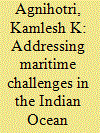

|
|
|
|
|
| Summary/Abstract |
The vastness and diversity of the Indian Ocean Region (IOR) and its littorals, and difference in the latters’ overall view of regional security, presents a broad spectrum of challenges therein. The maritime capacities of most littoral states are not strong enough to individually address these challenges. However, synergised response strategies, appropriately regulated by one or two collectively mandated apex bodies, would greatly help in managing regional maritime security. The existing maritime cooperative initiatives in IOR, like the Indian Ocean Rim Association (IORA) and Indian Ocean Naval Symposium (IONS), have shown great promise and potential. Countries like India and Australia, major players in both these constructs, can possibly rally other IOR littorals into leveraging their maritime capacities under these pan-regional fora by mutual agreement. Concurrently, both initiatives could find congruence in their maritime security visions, so as to create a collaborative local environment for collective benefits without dependence on extra-regional players.
|
|
|
|
|
|
|
|
|
|
|
|
|
|
|
|
| 2 |
ID:
142685
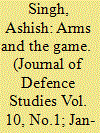

|
|
|
|
|
| Summary/Abstract |
The article approaches the issue of jointness through new lenses. It first describes how and why arms of the military, the ‘Services’, are different from each other. Airpower is shown to be the emerging technological paradigm, triggering paradigm competition. Next, it draws an analogy between anarchy in international relations (IR) and the existence of the services. It then looks at game theory as used in IR to understand both why inter-organisational competition occurs and how cooperation can evolve with a certain kind of behaviour—reciprocity. It also uses the anthropological/biological lens to show how competition and cooperation will always coexist. The article concentrates on the behavioural solution towards cooperation, while commenting briefly on the alternative structural solution, which most writings on the subject focus on. Finally, it lays out some measures possible in the Indian scenario, in tune with cooperation behaviour theory
|
|
|
|
|
|
|
|
|
|
|
|
|
|
|
|
| 3 |
ID:
142686
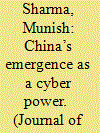

|
|
|
|
|
| Summary/Abstract |
Cyberspace is increasingly becoming an area of contestation among nation states. Similar to the physical domains of land, sea, air and space, superiority in the cyber domain enables a nation state to exert its cyber power. In recent years, China has invested colossal amounts in building the requisite infrastructure and capabilities of its armed forces as well as governance practices to advance towards ‘informationalisation’. This article seeks to discern the motives, threats, objectives, strategy and intent that drive China to amass cyber power.
|
|
|
|
|
|
|
|
|
|
|
|
|
|
|
|
| 4 |
ID:
142684
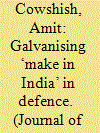

|
|
|
|
|
| Summary/Abstract |
In spite of spending close to Rs 500,000 crore on capital acquisitions between 2002–03 and 2014–15, the Indian Armed Forces continue to suffer from a chronic shortage of equipment and ammunition, low levels of serviceability of equipment already in service, and a heavy dependence on imports. The procurement programmes keep getting stalled or take inordinately long to fructify. There are several reasons for this morass; the primary ones being disjointed defence planning, limited budgetary support for modernisation of the armed forces, procedural complexities, and bureaucratic indolence. Of these, the factor that receives the greatest attention is the procedural complexity besetting defence procurements. The Defence Procurement Procedure (DPP) was first promulgated in 2002 and has been revised several times thereafter by the Ministry of Defence (MoD), in consultation with the users and the industry, but the problems, whether real or perceived, have persisted. More than a year into its five-year term, the present government set up a Committee of Experts (CoE) to address this problem holistically, against the backdrop of its ‘Make in India’ drive. This article presents a perspective on the report of the Committee and ends with a broad approach for phased implementation of the acceptable recommendations of the Committee.
|
|
|
|
|
|
|
|
|
|
|
|
|
|
|
|
| 5 |
ID:
142688
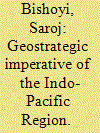

|
|
|
|
|
| Summary/Abstract |
The global economic power shift from the West to East (Asia) and the increasing geostrategic significance of the Indo-Pacific region has resulted in cooperation and competition among the established and rising powers in the region. While the economic cooperation between them has significantly grown in recent past, the geostrategic and geopolitical frameworks remain very uncertain. In essence, the emerging trends and issues in the Indo-Pacific offer unique opportunities as well as daunting challenges to the nations. These developments have generated great interest and debate among the researchers, academics as well as policymakers circles across the world.
|
|
|
|
|
|
|
|
|
|
|
|
|
|
|
|
|
|
|
|
|